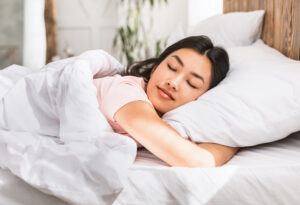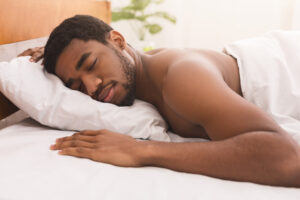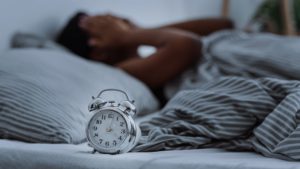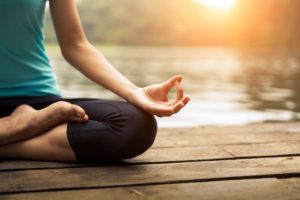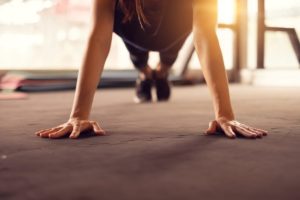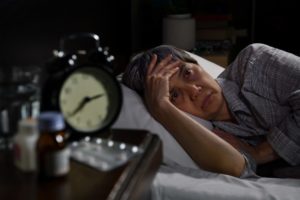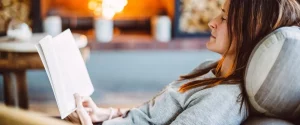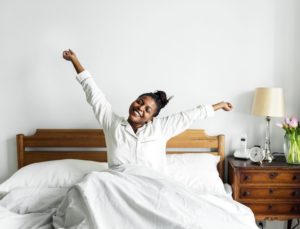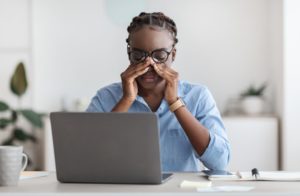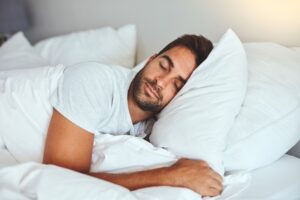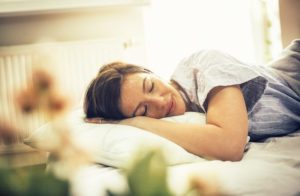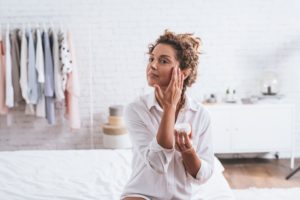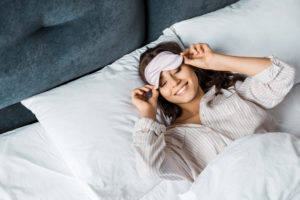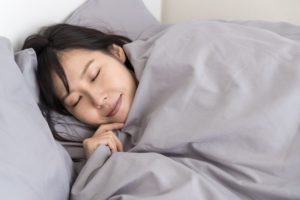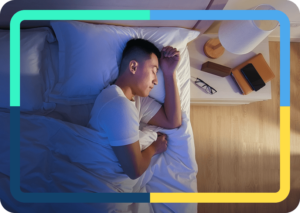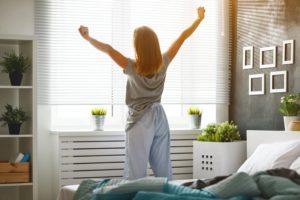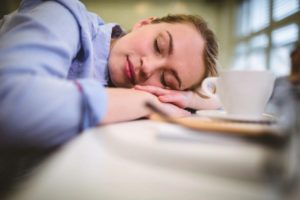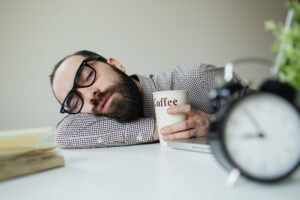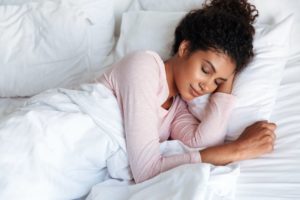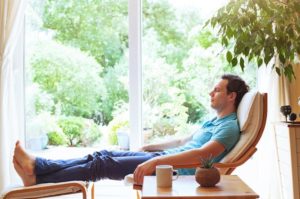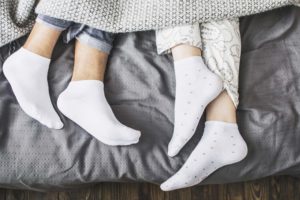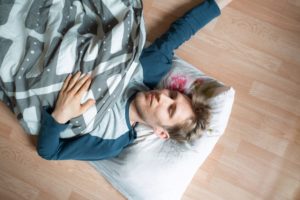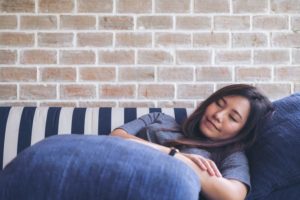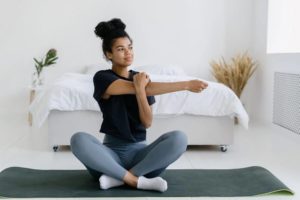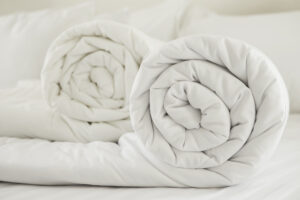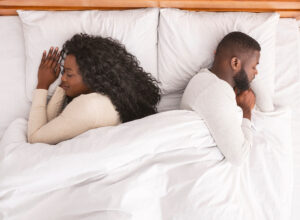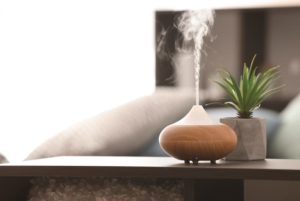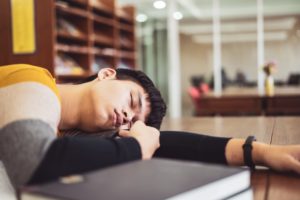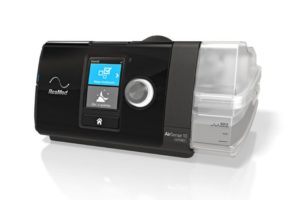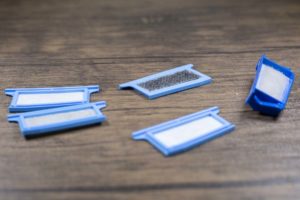When you buy through our links, we may earn a commission. Products or services may be offered by an affiliated entity. Learn more.
How To Determine Poor Sleep Quality
Do you often feel tired and groggy in the morning, even on nights when you’ve gotten enough sleep? It’s a frustrating experience, but there may be a simple explanation: you have poor sleep quality. Poor sleep quality can impair your focus, worsen your mood, and is even linked to an increased risk of Alzheimer’s disease.
Figuring out that you’re not getting enough sleep is easy. Figuring out why that sleep isn’t restful is trickier, but certainly achievable. Read on to learn the signs of lack of sleep, what could be causing your poor sleep quality, and how to improve it.
Looking to improve your sleep? Try upgrading your mattress.
Signs Your Sleep Quality Needs To Improve
If you think you’re getting poor sleep, consider whether you possess any of these tell-tale signs:
- You take more than 30 minutes to fall asleep after you get into bed.
- You regularly wake up more than once per night.
- You lie awake for more than 20 minutes when you wake up in the middle of the night.
- You spend less than 85 percent of your time in bed asleep.
- You feel tired and have difficulty concentrating during the day. You may be drinking more caffeine to stay alert.
- Your skin is breaking out and your eyes are puffy, red, or developing dark circles or bags.
- You feel hungry more often, especially for junk food, and gaining weight.
- You feel more stressed out, emotionally exhausted, and angrier than usual.
- You’ve been diagnosed with insomnia.
What Is Sleep Quality?
Sleep quality is different from sleep quantity. Sleep quantity measures how much sleep you get each night, while sleep quality measures how well you sleep.
Measuring sleep quantity is simple, as it’s quick to determine if you’re getting the recommended amount of sleep per night (usually defined as at least seven hours for adults). Measuring sleep quality is a little more of an art than a science. Generally, good sleep quality is defined by the following characteristics:
- You fall asleep soon after getting into bed, within 30 minutes or less.
- You typically sleep straight through the night, waking up no more than once per night.
- You’re able to sleep the recommended amount of hours for your age group.
- You fall back asleep within 20 minutes if you do wake up.
- You feel rested, restored, and energized upon waking up in the morning.
Reasons for Poor Sleep Quality
Any number of things could be contributing to your poor sleep quality. Some potential causes include poor sleep hygiene, stress, sleep apnea, or another chronic health condition or sleep disorder.
Poor Sleep Habits
Poor sleep habits, like having an irregular sleep schedule or consuming too much caffeine or alcohol, can interfere with your sleep quality. In a study of nursing students, smoking and daily coffee consumption were two of the largest factors associated with poor sleep quality. Alcohol also disturbs your sleep, even though it’s considered a sedative.
Stress and Anxiety
Poor mental health, whether from increased stress or a depression or anxiety disorder, also contributes to poor sleep quality. Problematically, sleep deprivation and the resulting insomnia worsen these conditions, creating a vicious cycle.
Chronic Health Conditions
Certain chronic health conditions are associated with poor sleep patterns and less sleep overall. These include chronic lung diseases, asthma, acid reflux, renal disease, cancer, fibromyalgia, and chronic pain. Unfortunately, as with stress and anxiety, poor sleep quality can exacerbate the symptoms and discomfort felt with these conditions.
Sleep Apnea
A person with sleep apnea experiences temporary lapses in breathing during their sleep, resulting in gasping, choking, and snoring sounds. Even if they don’t consciously wake up, their brain has to kick start breathing again, disrupting sleep quality. Sleepiness and lack of energyare two of the most common complaints of individuals with sleep apnea.
Undiagnosed Sleep Disorder
Because they occur in your sleep, some sleep disorders go undiagnosed until a person seeks care for other symptoms like poor sleep quality, or a sleep partner alerts them to the symptoms. For example, individuals with periodic limb movement disorder (PLMD) experience involuntary jerking movements in their legs while they sleep, resulting in reduced sleep quality, and fatigue and poor concentration during the day. Individuals with narcolepsy likewise often suffer from poor sleep quality, and experience daytime fatigue.
How To Improve Your Sleep Quality
Fortunately, improving your sleep quality may be as simple as improving your sleep hygiene. Just like dental hygiene involves regularly brushing and flossing to maintain your teeth, sleep hygiene is all about practicing good habits that help you get good sleep consistently.
Try these ideas to improve your sleep.
- Stop watching television and using your phone or computer for at least 30 minutes before bedtime. Electronic devices emit bright blue light that your brain perceives as sunlight, tricking it into delaying sleep and keeping you awake longer than you’d like.
- Transform your bedroom into a dark, quiet, and cool oasis. Set your thermostat to somewhere in the low- to mid-60 degrees Fahrenheit, and use blackout curtains or a white noise machine to further relax your senses.
- Go to bed and wake up at the same time every day. Following a consistent sleep schedule trains your brain to recognize when it’s time to sleep and when it’s time to wake.
- Make sure your sleep schedule allows for enough time to sleep. Adults need at least seven hours of sleep per night.
- Create a relaxing bedtime routine. Select activities that relax and calm you, like taking a warm bath, listening to an audiobook, or journaling. Performing these activities in the same order every night creates a pattern for your brain to recognize them as the prelude to sleep.
- Limit your caffeine and alcohol intake. Both of these substances can stay in your system for some time and disrupt your sleep quality. Avoid drinking alcohol within three hours of bedtime, and caffeine within five hours.
- Get some sunlight in the morning. Just 15-30 minutes outside in the sun can help wake you up and reset your circadian rhythm.
If you still have trouble sleeping after implementing these suggestions, talk to your doctor. They may recommend other lifestyle changes, therapies, or medications that can improve your sleep quality.
References
19 Sources
-
Medic, G., Wille, M., & Hemels, M. E. (2017). Short- and long-term health consequences of sleep disruption. Nature and science of sleep, 9, 151–161
https://pubmed.ncbi.nlm.nih.gov/28579842/ -
Yilmaz, D., Tanrikulu, F., & Dikmen, Y. (2017). Research on Sleep Quality and the Factors Affecting the Sleep Quality of the Nursing Students. Current health sciences journal, 43(1), 20–24.
https://pubmed.ncbi.nlm.nih.gov/30595850/ -
Ju, Y. E., McLeland, J. S., Toedebusch, C. D., Xiong, C., Fagan, A. M., Duntley, S. P., Morris, J. C., & Holtzman, D. M. (2013). Sleep quality and preclinical Alzheimer disease. JAMA neurology, 70(5), 587–593.
https://pubmed.ncbi.nlm.nih.gov/23479184/ -
Reed, D. L., & Sacco, W. P. (2016). Measuring Sleep Efficiency: What Should the Denominator Be?. Journal of clinical sleep medicine : JCSM : official publication of the American Academy of Sleep Medicine, 12(2), 263–266.
https://pubmed.ncbi.nlm.nih.gov/26194727/ -
Harvey, A. G., Stinson, K., Whitaker, K. L., Moskovitz, D., & Virk, H. (2008). The subjective meaning of sleep quality: a comparison of individuals with and without insomnia. Sleep, 31(3), 383–393.
https://pubmed.ncbi.nlm.nih.gov/18363315/ -
Chen, Y., & Lyga, J. (2014). Brain-skin connection: stress, inflammation and skin aging. Inflammation & allergy drug targets, 13(3), 177–190.
https://pubmed.ncbi.nlm.nih.gov/24853682/ -
Chervin, R. D., Ruzicka, D. L., Vahabzadeh, A., Burns, M. C., Burns, J. W., & Buchman, S. R. (2013). The face of sleepiness: improvement in appearance after treatment of sleep apnea. Journal of clinical sleep medicine : JCSM : official publication of the American Academy of Sleep Medicine, 9(9), 845–852.
https://pubmed.ncbi.nlm.nih.gov/23997695/ -
St-Onge, M. P., Roberts, A. L., Chen, J., Kelleman, M., O’Keeffe, M., RoyChoudhury, A., & Jones, P. J. (2011). Short sleep duration increases energy intakes but does not change energy expenditure in normal-weight individuals. The American journal of clinical nutrition, 94(2), 410–416.
https://pubmed.ncbi.nlm.nih.gov/21715510/ -
Rezaei, M., Khormali, M., Akbarpour, S., Sadeghniiat-Hagighi, K., & Shamsipour, M. (2018). Sleep quality and its association with psychological distress and sleep hygiene: a cross-sectional study among pre-clinical medical students. Sleep science (Sao Paulo, Brazil), 11(4), 274–280.
https://pubmed.ncbi.nlm.nih.gov/30746046/ -
Consensus Conference Panel, Watson, N. F., Badr, M. S., Belenky, G., Bliwise, D. L., Buxton, O. M., Buysse, D., Dinges, D. F., Gangwisch, J., Grandner, M. A., Kushida, C., Malhotra, R. K., Martin, J. L., Patel, S. R., Quan, S. F., Tasali, E., Non-Participating Observers, Twery, M., Croft, J. B., Maher, E., … Heald, J. L. (2015). Recommended amount of sleep for a healthy adult: A joint consensus statement of the American Academy of Sleep Medicine and Sleep Research Society. Journal of Clinical Sleep Medicine, 11(6), 591–592.
https://pubmed.ncbi.nlm.nih.gov/25979105/ -
Park, S. Y., Oh, M. K., Lee, B. S., Kim, H. G., Lee, W. J., Lee, J. H., Lim, J. T., & Kim, J. Y. (2015). The effects of alcohol on quality of sleep. Korean Journal of Family Medicine, 36(6), 294–299.
https://pubmed.ncbi.nlm.nih.gov/26634095/ -
Isaac, F., & Greenwood, K. M. (2011). The relationship between insomnia and depressive symptoms: genuine or artifact?. Neuropsychiatric disease and treatment, 7, 57–63.
https://pubmed.ncbi.nlm.nih.gov/21430795/ -
Parish J. M. (2009). Sleep-related problems in common medical conditions. Chest, 135(2), 563–572.
https://linkinghub.elsevier.com/retrieve/pii/S0012369209601525 -
Chotinaiwattarakul, W., O’Brien, L. M., Fan, L., & Chervin, R. D. (2009). Fatigue, tiredness, and lack of energy improve with treatment for OSA. Journal of clinical sleep medicine : JCSM : official publication of the American Academy of Sleep Medicine, 5(3), 222–227., , from
https://pubmed.ncbi.nlm.nih.gov/19960642/ -
MedlinePlus: National Library of Medicine (US). (2018, May 1). Restless legs syndrome., Retrieved December 15, 2020, from
https://medlineplus.gov/genetics/condition/restless-legs-syndrome/ -
Kim, L. J., Coelho, F. M., Hirotsu, C., Araujo, P., Bittencourt, L., Tufik, S., & Andersen, M. L. (2015). Frequencies and Associations of Narcolepsy-Related Symptoms: A Cross-Sectional Study. Journal of clinical sleep medicine : JCSM : official publication of the American Academy of Sleep Medicine, 11(12), 1377–1384.
https://pubmed.ncbi.nlm.nih.gov/26235160/ -
Shechter, A., Kim, E. W., St-Onge, M. P., & Westwood, A. J. (2018). Blocking nocturnal blue light for insomnia: A randomized controlled trial. Journal of Psychiatric Research, 96, 196–202.
https://pubmed.ncbi.nlm.nih.gov/29101797/ -
Johansson, A. E., Petrisko, M. A., & Chasens, E. R. (2016). Adolescent Sleep and the Impact of Technology Use Before Sleep on Daytime Function. Journal of pediatric nursing, 31(5), 498–504.
https://pubmed.ncbi.nlm.nih.gov/27184356/ -
Institute of Medicine (US) Committee on Military Nutrition Research. Caffeine for the Sustainment of Mental Task Performance: Formulations for Military Operations. Washington (DC): National Academies Press (US); 2001. 2, Pharmacology of Caffeine.
https://www.ncbi.nlm.nih.gov/books/NBK223808/



